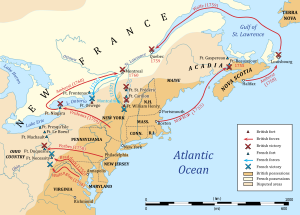French and Indian
| French and Indian War | |||||||||
|---|---|---|---|---|---|---|---|---|---|
| Part of the Seven Years' War | |||||||||
 The war theater |
|||||||||
|
|||||||||
| Belligerents | |||||||||
|
Catawba Cherokee (before 1758) |
Algonquin Lenape Ojibwa Ottawa Shawnee Wyandot |
||||||||
| Commanders and leaders | |||||||||
|
Jeffery Amherst Edward Braddock † James Wolfe † Earl of Loudoun James Abercrombie Edward Boscawen George Washington John Forbes George Monro |
Louis-Joseph de Montcalm † Marquis de Vaudreuil Baron Dieskau (POW) François-Marie de Lignery † Chevalier de Lévis (POW) Joseph de Jumonville † Marquis Duquesne Daniel Lienard de Beaujeu † |
||||||||
| Strength | |||||||||
| 42,000 regulars and militia (peak strength, 1758) | 10,000 regulars (troupes de la terre and troupes de la marine, peak strength, 1757) | ||||||||
British victory
The French and Indian War (1754–63) comprised the North American theater of the worldwide Seven Years' War of 1756–63. It pitted the colonies of British America against those of New France. Both sides were supported by military units from their parent countries of Great Britain and France, as well as by American Indian allies. At the start of the war, the French North American colonies had a population of roughly 60,000 settlers, compared with 2 million in the British North American colonies. The outnumbered French particularly depended on the Indians. The European nations declared war on one another in 1756 following months of localized conflict, escalating the war from a regional affair into an intercontinental conflict.
The name French and Indian War is used mainly in the United States. It refers to the two main enemies of the British colonists: the royal French forces and the various American Indian forces allied with them. The British colonists were supported at various times by the Iroquois, Catawba, and Cherokee, and the French colonists were supported by Wabanaki Confederacy members Abenaki and Mi'kmaq, and Algonquin, Lenape, Ojibwa, Ottawa, Shawnee, and Wyandot.
...
Wikipedia
